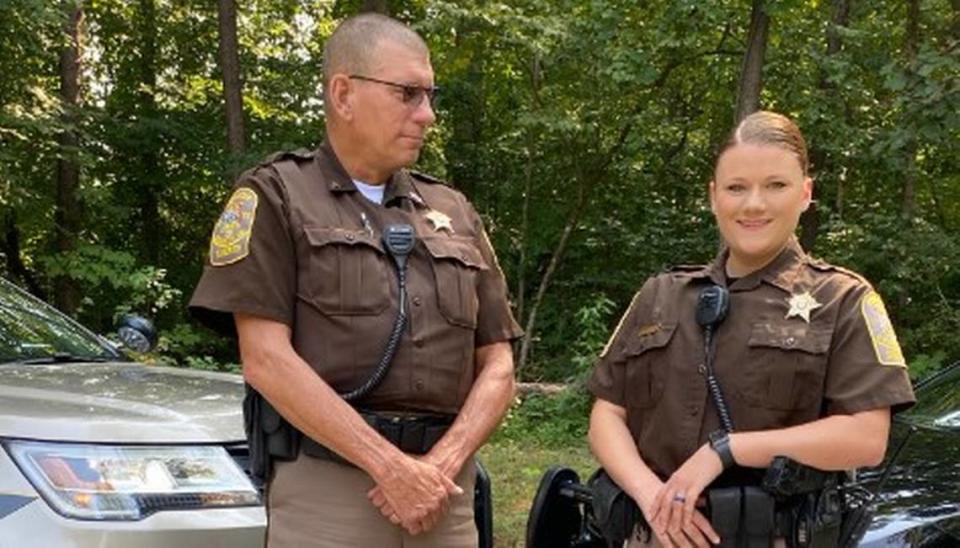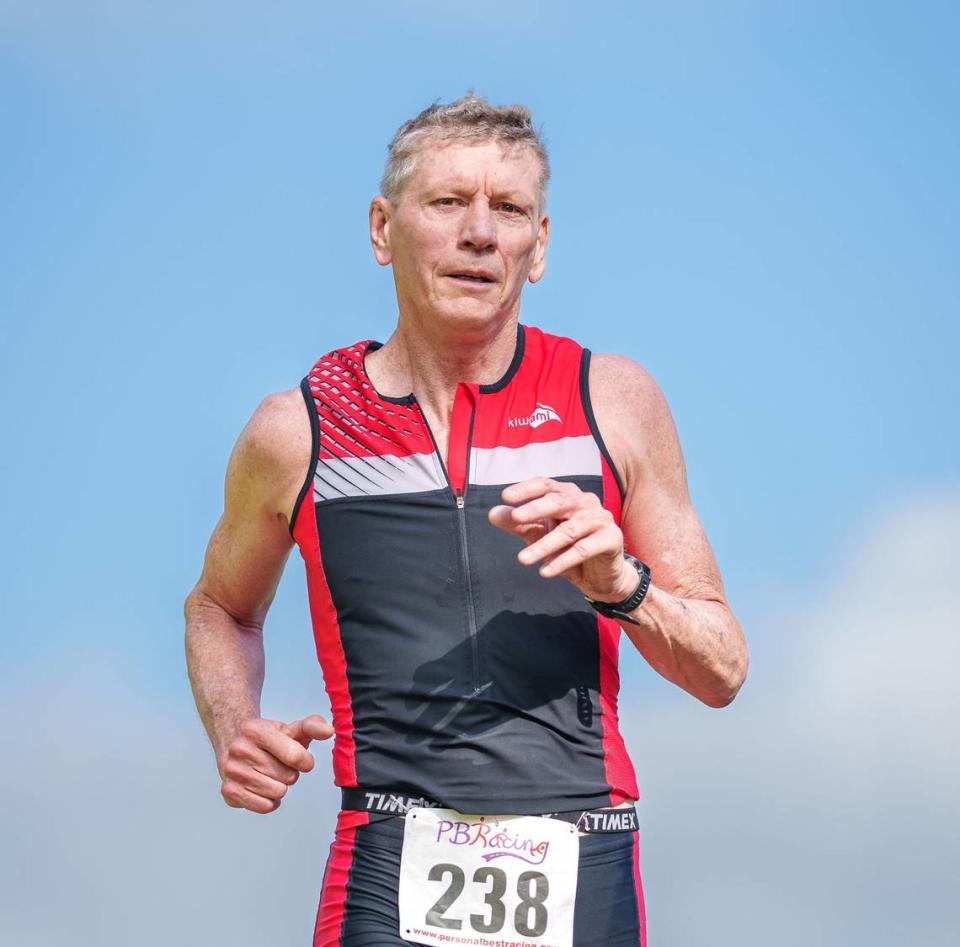A retired cop was willing to wait his turn for a kidney. His brother wouldn’t let him.
Glenn “Mart” Koontz, 63, has a vivid memory of the first conversation he had with one of his siblings after a doctor told him last May that his kidneys were failing — and that he needed a new one relatively soon.
“What are you going to do?” asked Mary, his younger sister, then 58.
“I’m gonna get on the transplant list, and I’m not gonna say anything,” replied Mart, a retired police officer living in Sunset Beach, North Carolina, matter-of-factly. More specifically, he meant he had no intention of saying anything to Dave, his older brother by two years.
For one, Mart simply didn’t feel right asking Dave — a retired Duke Energy engineer in Charlotte who’s been an avid triathlete for nearly four decades — to do that to his body.
There was an even stronger argument, however, in Mart’s mind: Mart, Mary and their older sister Cathy all have polycystic kidney disease (PKD), a genetic ailment that greatly increases a person’s risk for kidney failure. Dave is the only sibling without it. Cathy is now too old to be eligible for a transplant; but Mary, Mart thought, might someday find herself in kidney failure, too. If that happened and Dave still had both his healthy kidneys then, and if it turned out Dave was a match, she’d be able to skip the national transplant waiting list line.
Anyway, Mart was firm in that conversation with Mary. “I cannot,” he said, “ask David to do this.”
As it turns out, he didn’t have to. When Dave found out Mart was ailing, he didn’t hesitate.
He didn’t do any research about kidney transplants — the matching process, the million of hurdles potential donors have to clear, how invasive the procedure is, or what the recovery is like. He just called up his younger brother and said four words into the phone.
“I’m gonna do it.”
Mart, who spent 39 years in law enforcement jobs in Virginia, couldn’t say anything. All he could do was weep.
Drifting apart, coming together
Because they were so close in age, Mart and Dave spent a fair amount of time around each other as boys, if for no other reason than because they shared a bedroom.
But they lived different lifestyles growing up. Dave was a disciplined athlete, Mart was much more fun-loving and social.
And then as adults, they didn’t exactly keep in close contact. When Dave wasn’t working, he was almost always off swimming, biking or running around Charlotte, or traveling all over the country and the world competing in races with his fellow-triathlete-wife, Sharon. Mart, meanwhile, spent 25 years working for the Richmond Police Department, then another 14 in two different sheriff’s offices, assigned to midnight shifts for more than half of his career.

After Mart and his wife, Sandy, moved to Sunset Beach two years ago, Mart took a job working security at a North Myrtle Beach resort — where he works 3 to 11 p.m.
So he’s almost never had a normal dinnertime, Mart says, and there are probably times when his siblings might have thought of reaching out during the day and didn’t because they figured he was sleeping. “I’ve gotta freely admit that David and the two sisters more frequently talk,” he said. “It’s not that we didn’t get along, it’s just that our lives were different for a lot of years.”
Since that conversation with Mary last May, though — and particularly since that conversation with Dave — the siblings have been connected to each other more than they have since they were kids.
There has, after all, been a heck of a lot to talk about.
A series of setbacks, but ...
The good news for Mart was that Dave was a match. Otherwise, the past several months have been pretty brutal for him.
Over the winter, doctors at Atrium Health in Charlotte, where Mart is being treated, discovered that Mart’s PKD had caused both of his kidneys to grow to several times larger than those organs normally would be. Doctors determined that one of them would need to be removed in advance of any transplant, so they took his right kidney out in February.
The hope was that he’d recover enough to have the transplant done in April, but a week after he’d had the kidney removed, he fell while trying to get to the bathroom and fractured a vertebrae in his back. That prompted the hospital to postpone his transplant. On top of that, Mart has had to endure four-plus-hour dialysis treatments three days a week. Each one leaves him feeling exhausted until the next day. He hasn’t been able to return to his job at the resort due to the setback and the demands of the dialysis regimen.
But he knows it could be worse. Had Dave not stepped up as a donor, who knows?The average time frame for waiting can be three to five years at most centers, according to the National Kidney Foundation.
Instead, if all stays on track, he’ll have his older brother’s healthy kidney in him sometime next Wednesday.
‘David, thank you’
To the surprise of almost no one who knows him, Dave has been doing a little training this spring. For triathlons, yes, as usual — he did his last with two kidneys in Kingsport, Tennessee, at the end of April — but also for the surgery, his wife Sharon said.
“He’s working his ass off,” she says. “Lemme tell you, he’s worked out, and worked out, and worked out, and worked out.”

Sharon openly admits that all of this is “pretty scary with lots of unknowns for all,” and Dave cops to being “a little” nervous.
Since making the decision to donate, Dave has made a number of connections with others like him via Kidney Donor Athletes, a national organization working to educate and change the perception around live organ donation. He’s heard of members of that community having a wide variety of experiences, from those who’ve been able to start slowly running three weeks post-op to some who’ve said it took a year.
He obviously doesn’t want it to be a year.
“But ... if it takes a few more months than you were hoping it would, in the big scheme of things, big deal. If a year from now he’s doing fine and I’m doing fine, we’re good. I mean, something would have to go wrong for me not to be able to do stuff again. So I haven’t been doing much worrying about, ‘Well, you know, this is the end of me doing anything.’”
Instead — to the surprise of almost no one who knows him — Dave is already formulating a plan of attack for chasing his fitness goals post-op.
“Primarily you just don’t want to get dehydrated. You sure wouldn’t want to get back to training or racing and get to that point and you’ve only got one kidney doing the work,” he says, “and do any damage to it.”
‘David, thank you’
Asked what his brother’s commitment has meant to him, Mart reacts in much the same way as he did when Dave first made the offer.
His eyes fill with tears, and then those tears spill over his eyelids and down his face. For 20 seconds, he stays silent save for the just barely perceptible sound of his shaking breathing. Dave doesn’t say anything either as he sits in his office chair and looks at his brother’s image on FaceTime. He’s crying and breathing shakily, too.
Twenty more seconds pass, and Mart is asked if it’s overstating it to say Dave is saving his life.
“Absolutely not,” he says, as his voice continues to quaver.
Once he composes himself, Mart talks excitedly about getting off of dialysis, and getting back to walking the beat at his security job, and even more so, getting back to taking long walks with his wife and their dog.
But do not — he repeats, do not — expect him to take up triathlon.
“What he does has no appeal to me whatsoever. I’d rather read a good book. No, I don’t understand you,” Mart says, shaking his head at his brother. They both laugh.
They promise to talk again, soon. Maybe even later in the day, definitely in the next two. Their surgeries are coming up fast.
Then Mart says just one more thing before they hang up — something he’s said more times to his brother in the past several months than he’s said to him in his entire life.
“David, thank you.”
“There’s nothing I can do or say,” Mart says, “to adequately say thank you.”
-
Mart’s daughter, Laura Stephens, started a GoFundMe for her dad in February. Details: www.gofundme.com/f/marts-medical-bills-and-expenses

